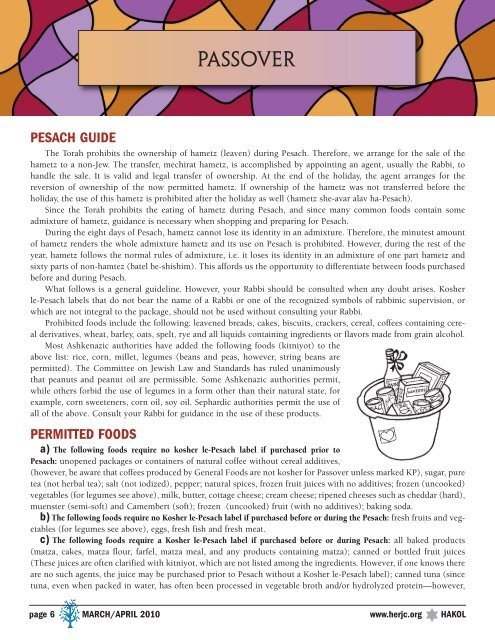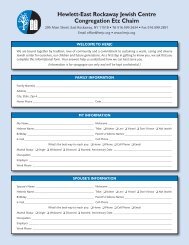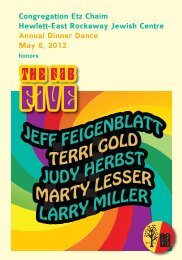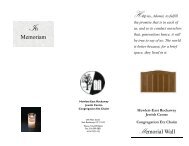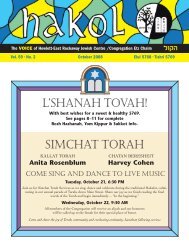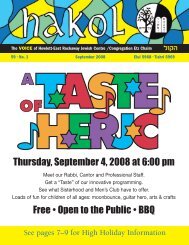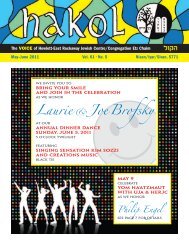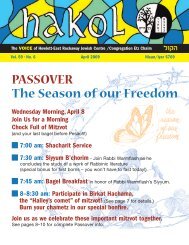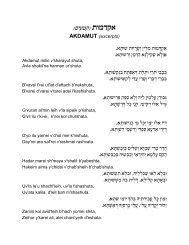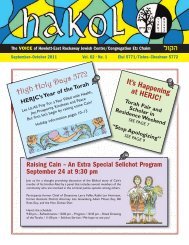Liz and Harold Kislik - Hewlett E. Rockaway Jewish Center
Liz and Harold Kislik - Hewlett E. Rockaway Jewish Center
Liz and Harold Kislik - Hewlett E. Rockaway Jewish Center
You also want an ePaper? Increase the reach of your titles
YUMPU automatically turns print PDFs into web optimized ePapers that Google loves.
PASSOVER<br />
PESACH GUIDE<br />
The Torah prohibits the ownership of hametz (leaven) during Pesach. Therefore, we arrange for the sale of the<br />
hametz to a non-Jew. The transfer, mechirat hametz, is accomplished by appointing an agent, usually the Rabbi, to<br />
h<strong>and</strong>le the sale. It is valid <strong>and</strong> legal transfer of ownership. At the end of the holiday, the agent arranges for the<br />
reversion of ownership of the now permitted hametz. If ownership of the hametz was not transferred before the<br />
holiday, the use of this hametz is prohibited after the holiday as well (hametz she-avar alav ha-Pesach).<br />
Since the Torah prohibits the eating of hametz during Pesach, <strong>and</strong> since many common foods contain some<br />
admixture of hametz, guidance is necessary when shopping <strong>and</strong> preparing for Pesach.<br />
During the eight days of Pesach, hametz cannot lose its identity in an admixture. Therefore, the minutest amount<br />
of hametz renders the whole admixture hametz <strong>and</strong> its use on Pesach is prohibited. However, during the rest of the<br />
year, hametz follows the normal rules of admixture, i.e. it loses its identity in an admixture of one part hametz <strong>and</strong><br />
sixty parts of non-hamtez (batel be-shishim). This affords us the opportunity to differentiate be tween foods purchased<br />
before <strong>and</strong> during Pesach.<br />
What follows is a general guideline. However, your Rabbi should be consulted when any doubt arises. Kosher<br />
le-Pesach labels that do not bear the name of a Rabbi or one of the recognized symbols of rabbinic supervision, or<br />
which are not integral to the package, should not be used without consulting your Rabbi.<br />
Prohibited foods include the following: leavened breads, cakes, biscuits, crackers, cereal, coffees containing cereal<br />
derivatives, wheat, barley, oats, spelt, rye <strong>and</strong> all liquids containing ingredients or flavors made from grain alcohol.<br />
Most Ashkenazic authorities have added the following foods (kitniyot) to the<br />
above list: rice, corn, millet, legumes (beans <strong>and</strong> peas, however, string beans are<br />
permitted). The Committee on <strong>Jewish</strong> Law <strong>and</strong> St<strong>and</strong>ards has ruled unanimously<br />
that peanuts <strong>and</strong> peanut oil are permissible. Some Ashkenazic authorities permit,<br />
while others forbid the use of legumes in a form other than their natural state, for<br />
example, corn sweeteners, corn oil, soy oil. Sephardic authorities permit the use of<br />
all of the above. Consult your Rabbi for guidance in the use of these products.<br />
PERMITTED FOODS<br />
a) The following foods require no kosher le-Pesach label if purchased prior to<br />
Pesach: unopened packages or containers of natural coffee without cereal additives,<br />
(however, be aware that coffees produced by General Foods are not kosher for Passover unless marked KP), sugar, pure<br />
tea (not herbal tea); salt (not iodized), pepper; natural spices, frozen fruit juices with no additives; frozen (uncooked)<br />
vegetables (for legumes see above), milk, butter, cottage cheese; cream cheese; ripened cheeses such as cheddar (hard),<br />
muenster (semi-soft) <strong>and</strong> Camembert (soft); frozen (un cooked) fruit (with no additives); baking soda.<br />
b) The following foods require no Kosher le-Pesach label if purchased before or during the Pesach: fresh fruits <strong>and</strong> vegetables<br />
(for legumes see above), eggs, fresh fish <strong>and</strong> fresh meat.<br />
c) The following foods require a Kosher le-Pesach label if purchased before or during Pesach: all baked products<br />
(matza, cakes, matza flour, farfel, matza meal, <strong>and</strong> any products containing matza); canned or bottled fruit juices<br />
(These juices are often clarified with kitniyot, which are not listed among the ingredients. However, if one knows there<br />
are no such agents, the juice may be purchased prior to Pesach without a Kosher le-Pesach label); canned tuna (since<br />
tuna, even when packed in water, has often been processed in vegetable broth <strong>and</strong>/or hydrolyzed protein—however,<br />
page 6 MARCH/APRIL 2010<br />
www.herjc.org<br />
HAKOL


